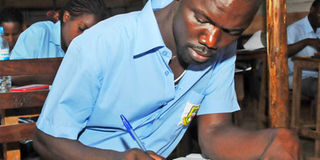40% fail sciences, says UNEB

A student sits for his Mathematics paper during last year’s UCE exams. PHOTO BY FAISWAL KASIRYE
What you need to know:
Performance. Uneb found that fewer candidates scored distinctions and credits with majority posting failures between 2010 and 2012.
Kampala. A Uganda National Examinations Board (Uneb) report has revealed that four out of every 10 Senior Four candidates (40 per cent) who sit national examinations annually fail the core subjects of Mathematics and Sciences.
The Uneb’s senior research officer, Ms Florence Obong, analysed results of students’ performance for three consecutive years starting from 2010 and found that fewer candidates scored distinctions and credits with majority posting failures.
The subjects which were looked at included: Mathematics, Physics, Chemistry and Biology for the three academic years of 2010, 2011 and 2012 Uganda Certificate of Education (UCE) examinations.
For instance, Ms Obong said in 2012, 66.9 per cent who sat Physics failed compared to 66.7per cent in the previous year.
Chemistry registered 75.6 per cent failures in the same year up from 71.1per cent in 2011.
“There is no improvement in performance in the Sciences and Mathematics by gender. The majority of students simply get a pass and many of them (more than 40per cent) on average fail,” the report reads in part.
The report observes that the way teachers conduct the lessons has an impact on the students’ learning and eventually affects their performance.
It further states that female students, especially from mixed schools, shy away from doing experiments and this limits their understanding of the subject content.
While releasing the 2014 UCE results, Uneb executive secretary, Mr Mathew Bukenya, said although Mathematics and core Sciences were made compulsory since 2004 in lower secondary education, the numbers don’t translate with those that continue with the subjects at high school.
For instance, he said only 20 per cent of the candidates who sat Uganda Advanced Certificate of Education in 2014 offered Mathematics, Physics had 14.4per cent, Chemistry 11.5per cent while Biology was taken by 12.3 per cent. Worse, a large portion of these were unable to obtain a principal level pass.
The reports recommend that Uneb considers embedded assessment to help teachers gain insight into the learners’ ideas and reasoning about the subject matter content in the sciences.
To enable students think critically, National Curriculum Development Centre was advised to introduce investigative practical science instead of instructional practical to boost interest of learners with negative attitude in Sciences.
INVIGILATORS ON THE SPOT
In another Uneb research released last week titled, “Level of effectiveness of invigilators, supervisors and scouts in the monitoring of Uneb examinations in the case of Primary Leaving Examinations,” Mr Thomas Kagoro, the Uneb senior research officer, said the roles of invigilators, supervisors and scouts are duplicated and advised that one should be done away with.
“We have to revise the structures. Many invigilators, supervisors and scouts are not conversant with our guidelines. There is some kind of duplication of roles. We may not need supervisors in this process of monitoring exams. We can remove one category and maintain scouts and invigilators,” Mr Kagoro said.
Education minister Jessica Alupo said the findings will be used to improve the quality of assessment, education, teaching and learning.



